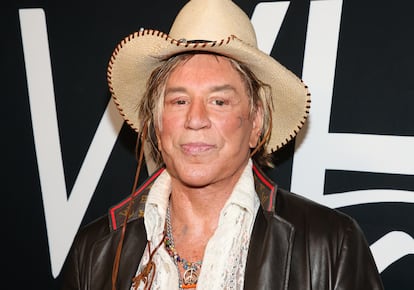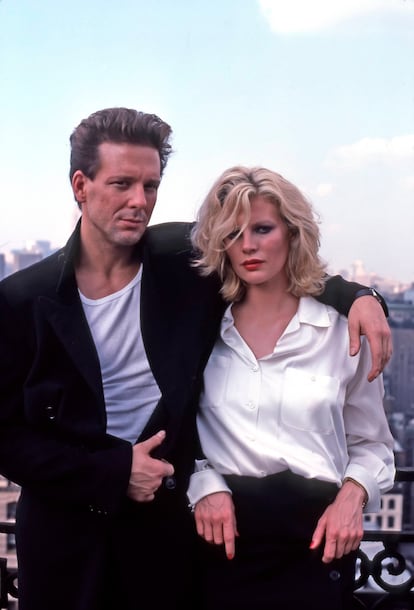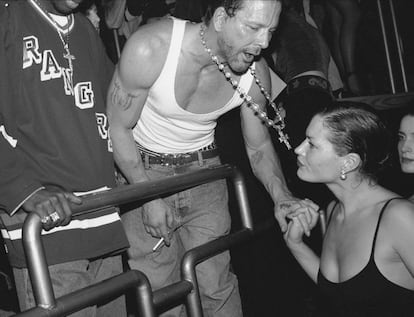Mickey Rourke’s latest downfall: From Hollywood star to getting kicked off ‘Celebrity Big Brother’
The actor, known for films like ‘9 1/2 Weeks,’ has finally buried his already faltering career, sparking numerous controversies in his first hours as a contestant on the British reality show

Disoriented, erratic, hesitant, and chaotic — Mickey Rourke’s entrance into the British Celebrity Big Brother house mirrors the trajectory of his later years— or decades? — in his career. The actor, once a generational icon with films like 9 1/2 Weeks (1986) and Angel Heart (1987), has made headlines again this week with his appearance on the celebrity edition of the reality show broadcast by ITV. It’s yet another chapter in the decline of a career that, despite moments of revival, never truly regained its 1980s brilliance.
Justifying the risky decision to join the show’s cast, he claimed: “My career is in the toilet” “It was between this or a really bad independent movie, and I’ve had it up to here with really bad independent movies,” he confessed to The Sun. Of all the bad choices Rourke has made over the past half-century, this one is perhaps one of the most questionable.
Tabloids have wasted no time in feeding their digital platforms with footage of the disoriented star’s behavior inside the house — now monitored by 24-hour surveillance. A parody of himself, prone to self-sabotage, Rourke has already made headlines in just five days. His antics include groping and lascivious glances toward the show’s host, AJ Odudu; brushing his teeth in the kitchen sink; and displaying an unrecognizable face marred by the numerous surgeries he’s undergone due to injuries from his boxing career — he started fighting professionally at the age of 12.
According to British media, Rourke is the highest-paid contestant on the show, reportedly receiving nearly €600,000. The producers see him as a perfect fit: “a loose cannon, unpredictable, and capable of drawing viewers if he cracks under pressure.” They were right. Rourke was kicked out of the Celebrity Big Brother house over “instances of unacceptable behavior” and “inappropriate language.”
The show’s producers had to intervene after Rourke used homophobic language against one of his fellow contestants, 21-year-old singer JoJo Siwa. This incident has even made headlines in prestigious Hollywood outlets, including Variety.
Rourke also attempted to break the rules, initially refusing to nominate anyone, though he eventually selected conservative politician Sir Michael Fabricant.
Given the trajectory of his career, such a downfall was more than likely. Rourke himself admits that his life has been nothing more than a series of consecutive mistakes, and his reputation in Hollywood has made even the directors he most admires “afraid” of working with him. “I have nobody to blame for my ship sinking except myself,” he reflected in his interview with The Sun. He’s right: Pulp Fiction, Rain Man, The Silence of the Lambs, and The Untouchables are just a few of the iconic films he turned down.
In the interview, Rourke also expressed his concern over the recent death of his fellow actor Val Kilmer, acknowledging the fragility of life and his desire to seek a higher quality of life in what he calls the “fourth quarter” of his existence.
“I’m not what I used to be. I’m not the guy that went out eight nights a week picking up supermodels. Look at the way Mick Jagger reinvented himself. Mick moves around like a teenager because he trains 45 minutes a day and he looks after himself proper. He’s a role model for me in that sense, absolutely,” he said. “I think about my own mortality all the time because my psychiatrist said, ‘If you didn’t go to therapy, you wouldn’t be sitting here.‘”

He’s not the first fading Hollywood star to sell his already caricatured image to this kind of format, becoming the subject of memes, mockery, and morbid comments on social media. David Hasselhoff, Kirstie Alley, and Carmen Electra all tried, unsuccessfully, to use live-action TV as a springboard to relaunch their careers or revive their status as pop icons.
The truth is, the New Yorker has little to lose. His filmography has been stacked with titles over the past decade, mostly intended for casual post-dinner conversation, and the days when his comeback seemed possible — like his Oscar nomination for The Wrestler (2008) and the critical and audience support for Sin City (2005) — are now long gone.
Without a partner since 2018 and no children, his only companions on the other side of the Big Brother house are his numerous dogs, to whom he dedicates most of his Instagram posts. Rourke has even said that he understands these animals better than people and that they’ve literally saved his life.
“I was going through a really rough time. I was hurting myself and I was sitting in the closet one day. I couldn’t take it anymore and picked up a gun,” Rourke said, as quoted by Page Six. “I was deciding what part of my head to put it on and my dog, Beau Jack, he [cried] and I looked over and he looked up at me like this and ... he said [with his eyes], ‘Who’s going to look after me?’ And it made me put the gun down.”
Once compared to James Dean and Marlon Brando, acting was primarily a way for Mickey Rourke to escape a childhood marked by the fact that his father left him when he was just a boy and the abuse he suffered at the hands of his mother’s new husband, a Miami police officer. This traumatic episode, which he also recalled on Big Brother, claimed to have led to lifelong insomnia.
After being forced to quit boxing due to several concussions — although he would return to it once he was already a household name — Rourke borrowed $400 from his sister and moved to New York to try his luck as an actor. He found early success but quickly cultivated a reputation as a performer as brilliant and seductive as he was tortured and difficult.
“Working with Mickey is a nightmare,” said filmmaker Alan Parker, whose sentiments were echoed by former colleagues like Robert De Niro and Kim Basinger. In a 1994 article in EL PAÍS, playwright and filmmaker Juan Cavestany described Rourke as “the most despicable guy of the 1990s.”
Although he was first married to actress Debra Feuer, his fall from grace mirrored the failure of his six-year marriage to model Carré Otis, whom he met on the set of Wild Orchid. Otis and Rourke divorced in 1998. The actress recounted a true ordeal of physical and emotional abuse at Rourke’s hands. Alongside constant shoving and slapping, Rourke’s unfounded jealousy forced Otis to turn down job offers, while his infidelity with other women was a source of constant pain.
In her memoir, Beauty, Disrupted, Otis recalled that Rourke’s marriage proposal was not only unconventional but disturbing: he offered her a ring in one hand while, with the other, he wielded a sword and swore to kill himself if she didn’t accept. “By everyone else’s standards, I had everything I could possibly want: a big, beautiful home, a relationship with a famous actor. But I had to stop counting there,” wrote Otis, who ultimately dropped the charges against him.

The actor was plunged into ruin. “I lost everything, the wife, the house, my friends, my name in the business. I was paying $500 a month for an apartment with my dogs. Nobody really knew how broke I was. A friend used to give me a couple of hundred of dollars a month to buy something to eat,” he told The Guardian in 2018.
The resounding success of The Wrestler— which won him a Golden Globe and BAFTA — put his name back on the radar of casting directors in Los Angeles, and his appearances in commercial films like Iron Man 2 and The Expendables, along with several commercials in Europe, helped ease his ailing finances. Despite his fortune being estimated at around $5 million, his entry into Big Brother suggests that, 15 years later, his bank account has returned to the same poor health as his film career.
Sign up for our weekly newsletter to get more English-language news coverage from EL PAÍS USA Edition
Tu suscripción se está usando en otro dispositivo
¿Quieres añadir otro usuario a tu suscripción?
Si continúas leyendo en este dispositivo, no se podrá leer en el otro.
FlechaTu suscripción se está usando en otro dispositivo y solo puedes acceder a EL PAÍS desde un dispositivo a la vez.
Si quieres compartir tu cuenta, cambia tu suscripción a la modalidad Premium, así podrás añadir otro usuario. Cada uno accederá con su propia cuenta de email, lo que os permitirá personalizar vuestra experiencia en EL PAÍS.
¿Tienes una suscripción de empresa? Accede aquí para contratar más cuentas.
En el caso de no saber quién está usando tu cuenta, te recomendamos cambiar tu contraseña aquí.
Si decides continuar compartiendo tu cuenta, este mensaje se mostrará en tu dispositivo y en el de la otra persona que está usando tu cuenta de forma indefinida, afectando a tu experiencia de lectura. Puedes consultar aquí los términos y condiciones de la suscripción digital.









































